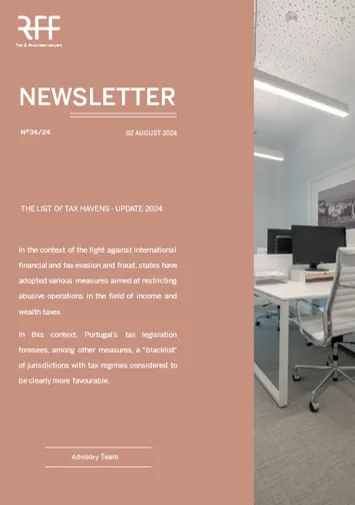The list of tax havens - update 2024

The list of tax havens - update 2024
FRAMEWORK
In the context of the fight against international tax evasion and avoidance, states have adopted various measures aimed at combating abusive operations in the field of income and wealth taxes, namely the creation of lists, known as "blacklists", of opaque jurisdictions or territories or regions with tax regimes considered to be clearly more favourable - commonly known as "tax havens".
The decision to include a country, state or region on the "blacklist" is unilateral, under the rules foreseen in Portuguese tax legislation but subject to review by the government, either spontaneously or at the express request of the competent body of the jurisdiction concerned, indicating that it no longer fulfils one or more of the criteria for inclusion on the list.
THE CURRENT REGIME
Portugal has a mixed prevention system in place to combat international tax evasion and fraud. The aforementioned list of jurisdictions considered to be "tax havens" is enshrined, combined with other measures, such as the so-called controlled foreign companies’ regime, or an additional clause identifying other "tax havens".
The criteria for inclusion on the "blacklist" are:
a) there is no tax of the same or similar nature to Portuguese Corporate Income Tax or, if there is, the applicable rate is less than 60 per cent of the general rate of that tax
b) the rules for determining the tax base on which income tax is levied differ significantly from internationally accepted or practised standards
c) the existence of special schemes or tax benefits resulting in a substantial reduction in taxation
d) legislation or administrative practice does not allow access to and effective exchange of information relevant for tax purposes
In addition to these criteria, national legislation provides for the aforementioned additional clause, under which the tax authorities are allowed to consider other jurisdictions as "tax havens" on a case-by-case basis, subject to the cumulative verification of the following criteria:
a) There is no tax akin to the Portuguese Corporate Income Tax or, if there is, it provides for a tax rate of less than 60 per cent of the rate of that tax:
b) The law provides for the application of this additional clause in the specific case
c) there are special relationships between persons or entities resident in that other territory and persons or entities resident in Portuguese territory, in the context of that specific case
d) the jurisdiction in question is not a member State of the European Union or the European Economic Area, in the latter case if it is not bound by administrative co-operation in tax matters.
In the context of the application of this open clause, and as already mentioned, international tax transparency is an excluding factor, acting as a safeguard clause. In this sense, for the tax authorities not to make use of this open clause, the existence of binding interstate administrative co-operation instruments equivalent to those existing within the EU framework is sufficient.
However, the legislation currently in force in Portugal is somewhat inconsistent, as there are countries listed as "tax havens", with whom, and at the same time, Portugal entered international double taxation agreements.
Doubts also arise as to the compatibility of considering as tax havens countries that are signatories to the Organisation for Economic Co-operation and Development's (OECD) Convention on Mutual Administrative Assistance in Tax Matters - in which 141 jurisdictions participate, including Portugal, since 1st March 2015 - and comply with the OECD/Global Forum ratings.
In addition, regarding the classification of a cooperating or non-cooperating state according to the OECD's ratings of standards of cooperation and fiscal transparency, it should be noted that there are a number of jurisdictions included in the Portuguese list as "tax havens" that are considered "largely compliant" by the Global Forum - the same rating achieved by Portugal to date.
It should also be noted that, in the context of information exchange on tax matters, data security and privacy is an issue that is becoming increasingly important. Despite the fact that the various mechanisms formally ensure confidentiality and data protection, including specific norms on double taxation treaties entered by Portugal, it is important that such protection is effective and real, in line with what has been reiterated by independent international organisations within the framework of the EU and the European Convention on Human Rights.
On the other hand, it is worth mentioning that the exchange of information raises concerns about the dissipation in a chain of information held by a particular tax administration of the tax, personal, banking or business information of its taxpayers.
THE IMPORTANCE OF A TERRITORY CONSIDERED A "TAX HAVEN"
In Portugal, the consequence of these rules is higher flat rates, such as a 35 per cent rate on capital income paid by entities resident in tax havens (IRS and IRC); as is the case with IMI, IMT and AIMI rates. There are also plans for taxation through the imputation of gross capital (as in the case of IMI, where the amount of tax payable will be 1/15th of the asset value of the building in question) and restrictions on the deductibility of losses, as in the case of capital losses derived from the sale of shareholdings in tax havens, among other measures, such as the aforementioned regime for controlled foreign companies.
When Portugal concludes a DTT with a jurisdiction that it categorises as a "tax haven", the question arises as to whether this classification is in breach of the DTTs concluded.
NON-COOPERATIVE JURISDICTIONS FOR TAX PURPOSES (THE EUROPEAN UNION'S "BLACK" LIST)
The EU has two lists of jurisdictions considered to be "non-cooperative": a "black list", which includes jurisdictions that do not meet the established criteria, and a so-called "grey list", which includes jurisdictions that, although they do not yet meet the required criteria, have committed to aligning their practices, standards, transparency and tax governance with international standards.
The inclusion of a given jurisdiction in any of the lists is dependent of an evaluation conducted by the European Commission and based on three criteria:
a) fiscal transparency
b) fair taxation
c) measures against base erosion and profit shifting (BEPS)
In addition, the existence (or not) of a "zero" corporate income tax is also taken into account.
Finally, it should be noted that the EU's creation of the "black list" and the "grey list" has shown results as a mechanism to encourage third countries to adopt measures aimed at tax transparency and good governance. According to official EU information, since the introduction of the blacklist, at least 60 countries have taken measures to address the European Commission's concerns and more than 100 harmful regimes have been abolished.
Currently, based on the latest and most recent update, the following jurisdictions are on the European Union's blacklist:
a) American Samoa
b) Anguilla
c) Antigua and Barbuda
d) Fiji Islands
e) Guam
f) Palau
g) Panama
h) Russia
i) Samoa
j) Trinidad and Tobago
k) United States Virgin Islands
l) Vanuatu
Furthermore, the European Union's grey list currently includes the following jurisdictions:
a) Armenia
b) Belize
c) British Virgin Islands
d) Costa Rica
e) Curaçao
f) Essuatíni
g) Malaysia
h) Seychelles
i) Turkey
j) Vietnam
It should be noted that the next update of the non-cooperative jurisdictions is scheduled for October 2024.
FINAL NOTES
Ordinance no. 309-A/2020, of 31st December 2020, the most recent amendment to Ordinance no. 150/2004, of 13th February, which approved the list of countries, territories and regions with clearly more favourable tax regimes (see Annex I), determined the exclusion of Andorra from the Portuguese "black list", with effect from 1st January 2021.
However, it is worth mentioning that even after Andorra's withdrawal, the list of countries on the "blacklist" still raises some questions.
In fact, the Portuguese "blacklist" is one of the most numerous in the EU - 78 countries remain from the original list of 83 - and some member states don't even have a "blacklist", such as Germany.
One example is Hong Kong, which remains on the Portuguese "blacklist" even though it was excluded from the EU list in 2004. Similarly, Lichtenstein, which is on the Portuguese blacklist, was also excluded from the EU list in 2018, after the country adopted legislation aligning its financial transparency requirements with EU norms to demonstrate a commitment to combating tax evasion and illicit financial activities.
In this context, the debate on whether the Portuguese "blacklist" should undergo additional revisions, particularly in terms of its model, scope and requirements, remains relevant and highly topical, given that, on the one hand, attracting foreign investment is seen as a strategic priority for the country and, on the other, some jurisdictions that the vast majority of the international community recognises as compliant are kept on this list of undesirables, as well as jurisdictions with which Portugal has signed, directly or indirectly, relevant agreements on tax matters or on the exchange of information on tax matters, which are not consistent with their inclusion on the "blacklist".
***
Rogério Fernandes Ferreira
Marta Machado de Almeida
Álvaro Silveira de Meneses
Miriam Campos Dionísio
João de Freitas Jacob
José Nuno Vilaça
Joana Fidalgo Barreiro
